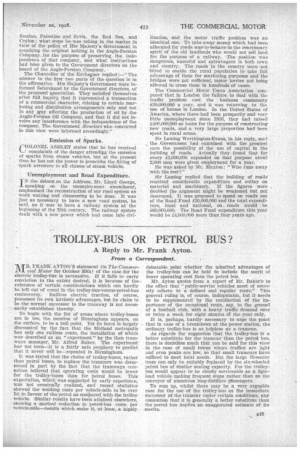TROLLEY–BUS OR• PETROL BUS?
Page 11

If you've noticed an error in this article please click here to report it so we can fix it.
A Reply to Mr. Frank Ayton. From a Correspondent.
AiRe iciFitifAioNtK _kf 0YrT00eNto'Sb esrta3toet•mh el not f (in th eT hcase e C'ef mo rmtehreelectric trolley-bus is persuasive. If it failsto carry conviction to the extent desired, it is because of the existence of certain emsiderations which can hardly be left out of count in the trolley-bus-versus-petrol-bus controversy. Railles.e electric traction, of course, possesses its own intrinsic advantages,' but its claim to be the normal .successor to the tramway is not necessarily established thereby. To begin with the list of areas where trolley-buses are in use, the mention of Birmingham appears, on the surface, to be a bull point. Yet its force is largely discounted by the fact that the Midland metropolis has only one railless route, the installation of which was described as an " experiment " by the then tramways manager, Mr. Alfred Baker. The experiment has not been—it is a fairly safe prophecy to predict that it never will be—repeated in Birmingham. lit was stated that the choice of trolley-buses, rather than petrol buses, to replace the tramcars was determined in: part by the fact that the tramways Millrnittee believed that operating costs would be lower for the trolley-buses than for Petrol buses. This expectation, which 'was supPerted by early, experience, was not eventually realized, and recent statistics showed the working costs per vehicle-mile to be over id. in favour of the petrol as comPared with the trolley vehicle. Similar results have been attained elsewhere, showing a marked reduction in petrol-bus costs per velecle-mlle—results which make it,at least,a highly debatable point whether the admitted advantages of the trolley-bus can be held to include the merit of lower operating cost than the petrol bus. Mr. Ayton quotes from a report of Mr. Baker's to the effect that "public-service vehicles must of necessity adhere to a defined and regular route." This general ruling is, of course, indisputable, but it needs to be supplemented by the recollection of the importance of the occasional route, say, to the ground of a football club, with n. heavy traffic demand once or twice a week for eight Months et the year only. It is, perhaps, hardly necessary to urge the poiet that in case of a breakdown at the power station, the ordinary trolley-bus is as helpless as a tramcar. As regards the suggestion that the trolley-bus is a better substitute for the tramcar than the petrol bus, there is doubtless much thee can be said for this view in the ease of small towns where traffics are light and even peaks are low, so that small tramcars have sufficed to meet local needs. But the large 70-seater tram can only be suitably replaced by the six-wheeled petrol bus of similar seating capacity. For the trolleybus would appear to be chiefly serviceable as a lightload vehicle making frequent stops rather than as the conveyor of ninnerous long-distdnce /Passengers. To sum up, whilst there may be a very arguable case for the use of the trolley-bus as the immediate successor of the tramcar under certain conditions, any contention that it is generally a better substitute than the petrol bus implies an. exaggerated estimate of its .merits.








































